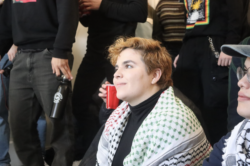Georgetown University has escaped the latest round of lawsuits filed by the Recording Industry Association of America, according to the Electronic Frontier Foundation, an advocacy group for civil liberties on the Internet.
The Hoya reported last Tuesday that two Georgetown students were candidates for suits brought for violation of copyright laws.
But according to Wendy Seltzer of the EFF, it is impossible to know the identity of those being sued. No one, not even the RIAA or those being targeted, knows the names of the offenders, she said.
Nick Timaraos, the News Editor at The Hoya, says they stand by their story.
What are known, however, are the names of the Internet providers and the IP addresses of those offenders. There are three lawsuits against Internet provider addresses pending in New York and one in Washington DC. In connection with these suits, the RIAA has subpoenaed 532 IP addresses.
However, no IP addresses on the Georgetown network have been subpoenaed.
The RIAA has previously sued specific usernames, but that practice was voided by a D.C. court on the grounds that it violates Internet privacy laws. The decision does not prevent the RIAA from issuing subpoenas for IP addresses, however.
File downloading and sharing is so prevalent, especially on college campuses, that suits brought by the RIAA are a natural concern for students as well as the University, which would be implicated in the suits as the Internet provider.
Both concern and anger were echoed in the words of Brad Kuntscher (CAS ‘05), who was taken aback by the RIAA action. “The hard-nosed approach was somewhat ridiculous because in the end, people will find more successful ways to download,” he said.
The RIAA has targeted students before. Last April, it filed four lawsuits against students at other Universities for infringement on copyrights. All four students settled, agreeing to pay between $12,000 and $17,000.
Moreover, this is not the first time file sharing concerns have touched Georgetown. Last year, student Alex Kline (CAS, ‘06) received an email from the University requiring that she erase her music downloading software. Kline complied, and, she said, authorities did not contact her again.
Currently, legal representation for the RIAA is petitioning the courts for permission to learn the names of the computer users who they believe participated in illegal file sharing. If the court rules that the names must be released then the RIAA may continue with legal action.




